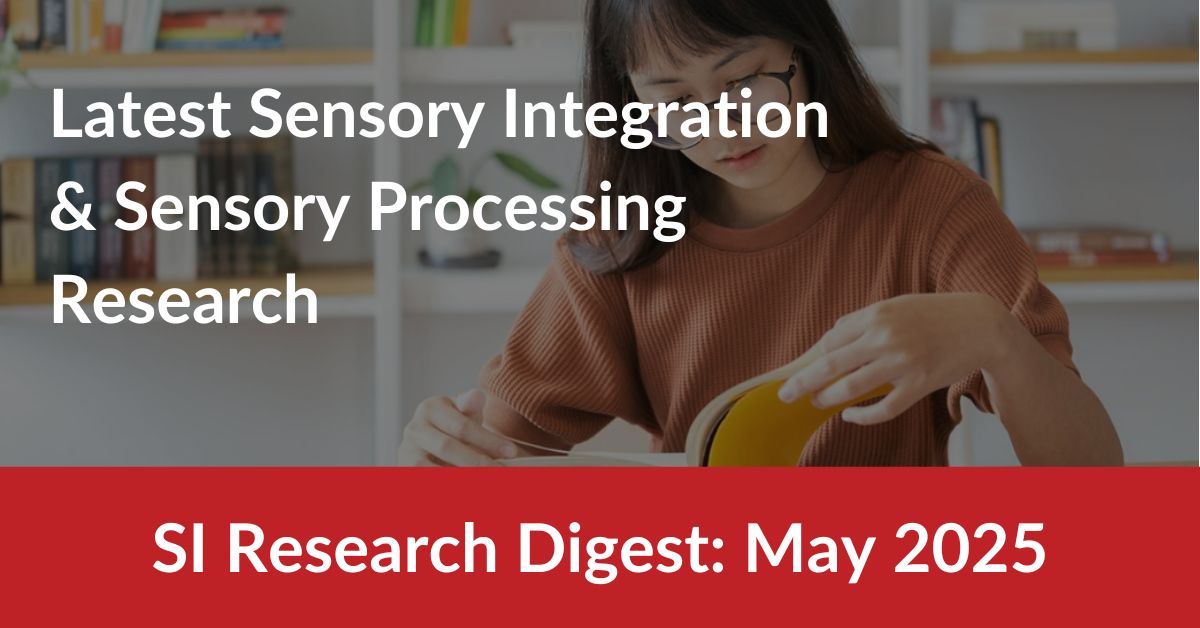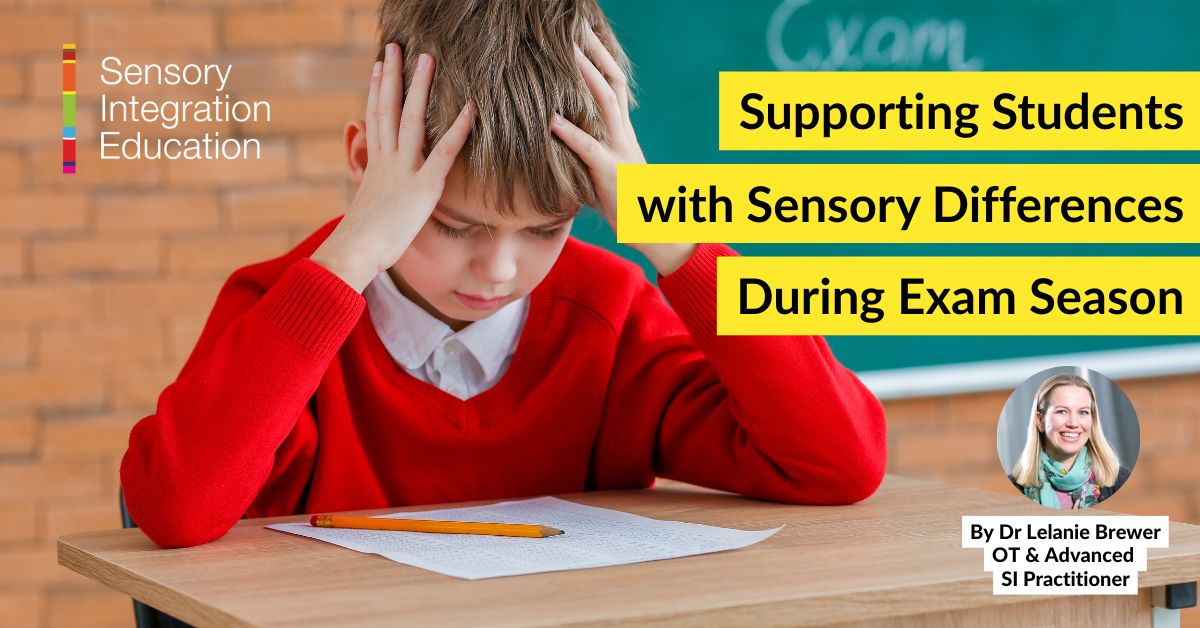EmphaSIze May 2025: Sensory Integration in Schools
By Sensory Integration Education, 6th May 2025

Welcome to the May issue of EmphaSIze where this month we're focusing on Sensory Integration in Schools!
Challenges in processing sensory information can significantly impact a child’s educational experience. With 1 in 6 children having sensory processing differences that make it hard to learn and function in school, it’s likely there are undetected and unsupported sensory needs in many classrooms today.
In this month's EmphaSIze, we've put together useful information, research, articles, books, and product ideas to help better inform ourselves of how sensory integration affects students’ behaviour and learning at school as well as insights and strategies for supporting students’ sensory needs and making schools a more sensory inclusive environment.
We’re also delighted to announce the launch of our new online course: Sensory Inclusion Facilitator Certificate. Read the article below to find out more about this new and exciting learning opportunity available to all health and care professionals!
News & Features
New Opportunity for All Health and Care Professionals - Become a Sensory Inclusion Facilitator
If you're a health or care professional working with people of any age, you’ve probably encountered individuals who struggle with everyday tasks because something just isn’t clicking between them, the task in hand or their environment. That’s where sensory processing differences come in and where your role can make a powerful impact.
Whether you’re a nurse, social worker, support worker, psychologist, OT assistant, social prescriber or Allied Health Professional, our new online course, Sensory Inclusion Facilitator Certificate, will help you look at the people you support through a new lens by integrating sensory-informed approaches into your work.
Built around a practical, real-world application of the Person-Environment-Occupation (PEO) model, the course gives you the framework to:
- Recognise the signs of sensory processing differences and understand their impact on daily life
- Support individuals to understand their own sensory preferences
- Adapt environments, tasks and your own approach to promote participation
The course includes a live online workshop day and an online assessment where you'll receive your Sensory Inclusion Facilitator certificate on completing it!
Enrol today and become a Sensory Inclusion Facilitator!
Thoughts from a Therapist: Breaking the Rules (A Bit)
“Rules – like them or loathe them? I’ve always struggled to follow arbitrary rules and tend to use my inner moral compass to help me navigate the world to an extent (within the law of course!).”
In this month's Thoughts from a Therapist blog, Anna Willis reveals her recent realisation that she’s a ‘disruptor’ - someone who challenges norms to bring about positive change!
Embracing her disruptor role can be challenging when working with schools and in her blog, Anna highlights a particular example involving a school uniform rule preventing a child with sensory differences from learning comfortably.
Read the blog in full to find out more!
Supporting Students with Sensory Differences During Exam Season
With GCSE and A-level exams as well as SATs tests taking place in the UK this month, exam season can be challenging for all students — but for those with sensory processing differences, it can be especially overwhelming. From itchy uniforms to noisy exam halls, sensory differences can spike under exam pressure.
However, small sensory adjustments can make a BIG difference for students managing exam stress. In our latest blog, we explore practical sensory-informed strategies to help students feel more comfortable and confident during this stressful time.
Read the full blog here.
Introducing Sensory Inclusive Schools for Professionals
Specialist services face a challenging landscape where people and funding are often stretched. SIE and Sensory Inclusive Schools are acutely aware of the effort professionals like yourselves invest in ensuring specialist resources are applied in the most appropriate and effective manner.
That’s why we’ve put together our Sensory Inclusive Schools for Professionals package which allows you to incorporate our sensory-inclusive framework into your services, creating a relationship that maximises the impact of specialised support within the constraints of stretched resources.
Sensory Inclusive Schools for Professionals includes the following courses:
--> Introduction to Sensory Processing and Key Concepts
--> Understanding Your Students’ Unique Sensory Profiles
--> 15 Steps to Creating a Sensory Inclusive School
as well as expert support via Ask Our Sensory Therapists form and weekly term-time peer support sessions.
Find out more about Sensory Inclusive Schools for Professionals here.
Also see:
Extra exam time: why do so many schoolkids suddenly need it?
Ways to make your learning materials accessible and inclusive
Exeter children’s library is getting a big makeover including a brand-new sensory area
Dad designs jacket for neurodivergent children
How autism can affect your relationship with food
Resources

Take a look at our books and products recommendations for this month:
The Neurodiversity Affirmative Child Autism Assessment Handbook: Published earlier this month, this comprehensive and detailed handbook covers the most up-to-date research and best practices to help guide you through creating a neuro-affirmative child autism assessment process for your practice. Created to encourage and empower clinicians to make a paradigm shift to a more neurodiversity-affirmative approach, this book is essential reading for those involved in assessing as well as working with autistic children more generally.
Gestalt Language Processing: Supporting Autistic and Neurodivergent Children with Natural Language Acquisition: This book is an invaluable resource for any Speech and Language Therapist, parent or teacher who is looking to further their knowledge and transform the language support they offer to autistic and neurodivergent children. It clearly sets out the stages of Gestalt Language Processing and the steps in therapy to effectively help neurodivergent children and young people to move on with their language development, supporting them to become independent and creative language users
Textured Sensory Bracelet: This 4-pack sensory textured bracelets can be worn on the wrist and offers a fun and effective way to relieve stress and anxiety for toddlers, children and adults as well as helping to promote focus and relaxation. Made from stretchy rubber material, the bracelets are durable and can be stretched and pulled without losing their shape and are also safe and gentle on the skin. Each bracelet comes in a different colour and unique texture and are a great toy for those seeking tactile sensory input.
Whizzy Dizzy: This is a great toy for young children seeking out vestibular sensory input. Children also work on bilateral coordination and motor planning whilst operating it and are always in control of their speed as the Whizzy Dizzy will only spin as fast as they are pulling on the wheel.
SI Research Digest

Below are links to the most popular sensory integration and sensory processing research papers and findings published on our social channels last month:
This new systematic review investigated the efficacy of Ayres Sensory Integration (ASI) as an intervention for children aged 0-12 years. The review which included 9 Randomised Controlled Trials (RCTs) found strong evidence to support the use of ASI to support autistic children in achieving individualised goals related to occupational performance, function, and participation.
This new systematic review investigated the relationship between interoception and mental health in middle-aged and elderly adults. The researchers observed correlations between interoceptive differences and higher levels of depression and difficulties with emotional regulation in this population.
My Autistic Meltdown: The Impact of Autistic Sensory Needs
A powerful read on autism and sensory overload. Autism acceptance needs to go further than tokenistic handouts or talks if we are truly looking at how to make the world sensory inclusive for autistic individuals and others with sensory differences.
Alexithymia May Explain the Genetic Relationship Between Autism and Sensory Sensitivity
This new study investigated the relationship between alexithymia and sensory processing differences in autistic individuals. The researchers found a correlation between sensory differences and alexithymia and evidence to suggest that alexithymia may explain individual differences in sensory processing in the autistic population.
Upcoming Courses and Webinars
We have a number of live webinars that take place throughout the year covering a broad range of SI-related topics. Below is a snapshot of webinars happening over the next few months or click here to view a summary of all the upcoming live events.
All these webinars are available to you by signing up to our Lifelong Learning Programme or can be purchased as individual courses:
- Sensory Spotlight Talk: Understanding Motor Disinhibition in Autism – 8 May 2025
- Fostering Connection and Co-regulation Through a Sensory Processing Lens – 27 May 2025
- A Virtual Reality Sensory Room for People with Neurodevelopmental Disabilities – 2 June 2025
- Introduction to the BUSS® (Building Underdeveloped Sensorimotor System) Model – 27 June 2025
- The Just Right Reach: Understanding Affordances and Sensory Discrimination in the Process of Praxis – 22 July 2025
Latest Job Listings
Are you thinking of making a career move this year? Check out our latest job listing:
Sensory Integration Occupational Therapist, Family Futures CIC, Islington, London, UK
Discounts & Special Offers
Please quote DISCOUNT CODE SIE20 for 10% discount on Southpaw orders up to £100. Orders must be placed by phone on +44 (0) 115 718 0020.
Would you like to receive EmphaSIze: The Sensory Integration Newsletter in your inbox? JOIN SIE FREE TODAY
Best wishes,
Sensory Integration Education
NB: Sensory Integration Education is not responsible for the content on external websites. Sharing a resource does not imply endorsement by Sensory Integration Education.







